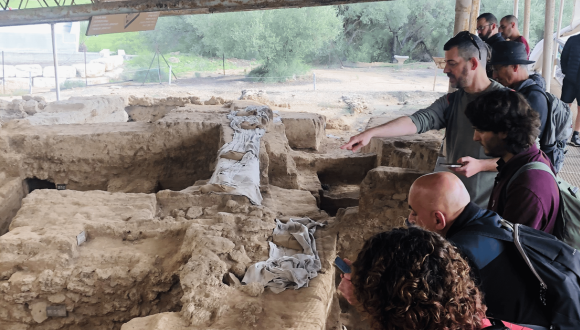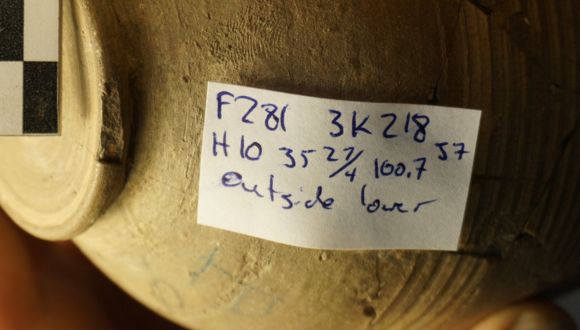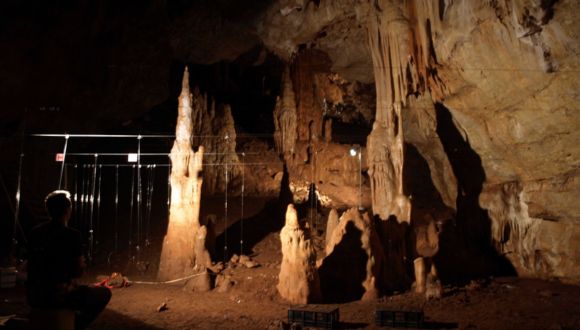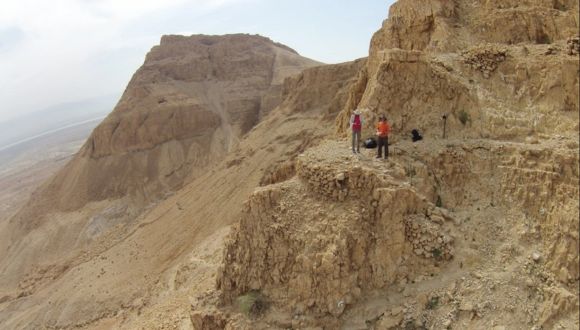Where the Land of the Bible Meets Modern Archaeology
Archaeology redefined with TAU’s world-class MA in Archaeology and Ancient Near Eastern Cultures
The International MA in Archaeology and Ancient Near Eastern Cultures (formerly, Ancient Israel Studies MA) at Tel Aviv University allows international students to learn from renowned faculty, join cutting-edge research projects, and get hands-on excavation experience in preparation for diverse careers in the field.
As Prof. Omer Sergi, the head of the MA program, explains, the biggest draw of the program comes from Israel’s reputation as a prominent leader in archaeology. Researchers from all over the world come to experience archaeology in Israel because of what Israel can offer.
“Regardless of what kind of archaeology you study—prehistoric archaeology, Greek and Roman archaeology, or biblical archaeology—Israel has it all.”—Prof Sergi
Let’s take a closer look at what makes TAU’s International MA in Archaeology and Ancient Near Eastern Cultures (Ancient Israel Studies MA) truly stand out.
Cradle of Western Civilization
“For Western civilization, the role of the Middle East, including Israel and Egypt, is unique—the beginnings of Western culture can be traced back to this region. Unlike Italy or Greece, Israel has experienced a million years of continuous habitation. There are very few places in the entire world comparable to Israel in this regard,” says Prof. Sergi.
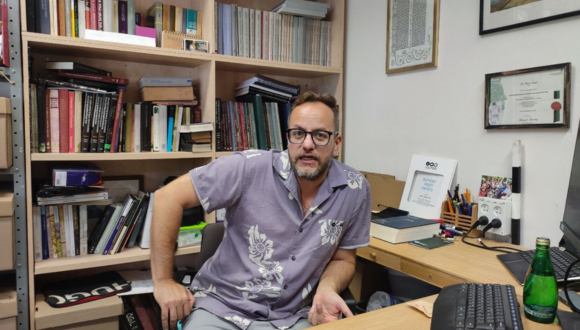
Professor Omer Sergi, the head of the Ancient Israel Studies MA program
He adds that “Israel is also the place where the Bible was written, both the Old and New Testaments–the land of Israel serves as the backdrop for most biblical stories.” This lends a special attraction to Israeli archaeology since biblical archaeology and archaeology of the New Testament are crucial for understanding monotheism, which is the core element of Western culture.
“Even if a person is completely secular and atheist, our worldview is still shaped by monotheistic ideals.”—Prof. Sergi
For Jonathan Steilmann, the fact that Israel is the “land of the Bible” was instrumental in his decision to choose TAU’s Ancient Israel MA. He also greatly appreciated the opportunity to study across different eras—Egyptian, Roman, Hellenistic periods, and more.
“That variety was really appealing to me, especially coming from Germany, where we mostly focus on the Roman period. Studying in Israel offered a much broader historical context.”—Jonathan Steilmann, alumnus of MA in Ancient Israel Studies
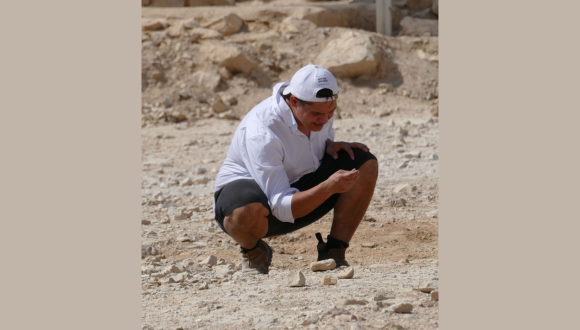
Jonathan Steilmann during one of the excavations
Expertise in Archaeology and Antiquities Management
Notably, scholars from the entire Western world, including Germany, come to Israel to learn from the Israeli Antiquities Authority how to manage a state organization responsible for regulating antiquities, whether in the ground or in museums—Israel was the first to create such an independent body.
The Institute of Archaeology and the Department of Archaeology at Tel Aviv University are among the leading institutions in the world and some of the greatest minds in the field are from Tel Aviv University.
Digging into History: Prestigious Excavation Projects
Tel Aviv University archaeologists excavate many important historical sites such as Jerusalem and Masada. Current flagship projects include the biblical site of Tel Azekah and Qesem Cave, among many others.
The Qesem site is particularly valuable because it contains unique evidence regarding the behavior and evolutions of early humans, including the development of the Homo sapiens
Graduate students work alongside their professors, learning how to professionally manage and conduct scientific excavations and applying their theoretical knowledge in the field.

Getting hands dirty at the archaeological dig
Minji Jin, MA alum from South Korea who participated in the Tel Azekah excavation, recalls how important for her research it was:
“Being physically there for a month helped me locate the findings and visually map the site.”—Minji Jin, graduate of MA in Ancient Israel Studies
Steilmann, who did a lot of fieldwork during his studies, not only as part of the program but also during vacation breaks, recalls: “It was amazing to dive into practical work right away.”
“On my very first day, I found a pottery shard and was so excited. It wasn’t a particularly notable find, but I still remember posting it on Instagram.”—Jonathan Steilmann
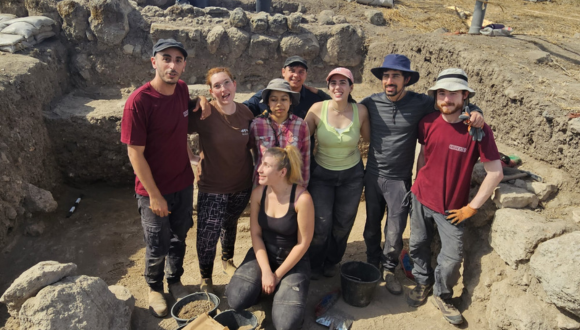
Summer field school is one of the components of the Ancient Israel Studies MA
Decoding the Past with Modern Science
In the past twenty years, TAU’s Institute of Archaeology has been leading the way in integrating archaeology with other sciences, such as biology, physics, chemistry, geology, and even mathematics, opening a whole new scope of research avenues.
Prof. Daphna Langgut, the head of the Archaeobotanical and Reconstruction of Ancient Environment Lab, has already won two international prizes for her groundbreaking studies in archaeobotany and archaeoparasitology.
Prof Langgut has developed systems to catch ancient pollen and reconstruct ancient gardens, which helped her reconstruct ancient climates and environments and identify climatic crises in the past.
Jin, who is now doing her PhD research under Prof Langgut’s supervision, comments that one of the approaches to understanding the Late Bronze Age collapse (and the onset of the Iron Age) suggests that the regional drought affected agricultural yields, which in turn induced political crisis and instability.

Pottery shards found during excavations
Other interdisciplinary projects at TAU’s Institute of Archaeology labs include studying ancient DNA, determining Earth’s magnetic field from archaeological finds, analyzing skeletal remains to understand health conditions and ancient diseases, or investigating composition of ancient pottery and also ancient metalworking techniques.
“We can look at a piece of pottery and say where it was made, where it was transported to, and what was in it. This evidence helps reconstruct ancient trade routes.”—Prof. Sergi

Prof. Sergi holding a small Canaanite vessel that led to the discovery of an entire administrative system in the Kingdom of Israel
Modern archaeology even allows researchers to read ancient molecules: “We found that in a military fortress of the house of David in Arad, Jehovah's Priests were smoking hash while doing rituals.”
Archaeology Careers Begin at TAU
Several career pathways are open to the program graduates, with many choosing to stay in academia since archaeology exists as an academic discipline in numerous colleges and universities around the world.

MA students on one of the field trips to an ancient site in Israel
As Steilmann notes, Ancient Israel MA has definitely shaped his future. He is now planning to pursue a PhD in archaeology, with a focus on the Jezreel Valley, combining biblical texts and archaeological findings to deepen the understanding of the region’s history.
“The journey has been incredible, and I look forward to what lies ahead in archaeology.”—Steilmann
Jin is also building an academic career—her interests lie in palynology [study of ancient pollen] and the ancient environment in prehistoric periods. For her PhD thesis, she is working on reconstructing the climate and environment conditions of two important Early–Middle Paleolithic sites.
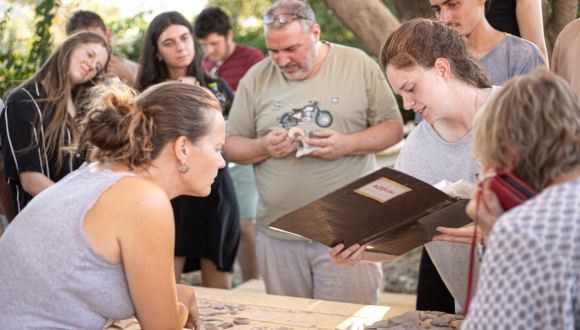
Classifying pottery finds during fieldwork
Since the Ancient Israel MA involves a lot of lab work and active participation in research projects, graduates are well-equipped to apply for PhD tracks in prestigious universities outside of Israel. One of Prof Segri’s students, for example, is now working on his PhD at UC Berkeley after successfully completing his MA at TAU and publishing several articles in reputable peer-reviewed journals, including the American Journal of Archaeology.
Another career track is to join state archaeology authorities. Many countries now have bodies like the IAA, the Israel Antiquities Authority, which provide plenty of job opportunities.

Archaeological finds from one of the excavation projects
Program graduates also often go on to work in archaeological museums as curators, researchers, or storers. Several alumni curate exhibits at the Israel Museum, and one is now employed by the British Museum in London.
Finally, there are private companies, which provide archaeological services where graduates can find employment.
Tel Aviv: A City Like No Other
What gives a special attraction to TAU’s Ancient Israel program is the incredible student experience in a city like Tel Aviv.
“I never met a student who came from Germany, France, America, Canada, Hong Kong, India, and didn't fall in love in Tel Aviv.”—Prof. Omer Sergi

Enjoying the beach
“International students want to stay in Tel Aviv because it's young, it's a beach city, and because there's a feeling of freedom in Tel Aviv, in a way which is very Israeli,” adds Sergi.
So, Why Archaeology?
Archaeology, essentially, is a study of human beings, human behavior, and human society, which makes it a very attractive field of study for many students.
For Steilmann, archaeology has completely changed his life and his perspective on history. He particularly loves the blend of theoretical and physical aspects: “You spend time thinking and researching, but you’re also out there physically uncovering history.”
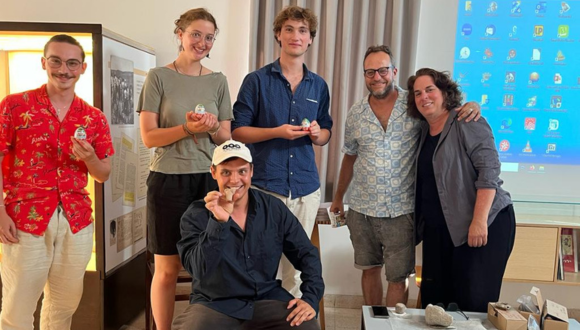
Jonathan Steilmann (in the center) and Prof Sergi (second from the right) with MA students
“It’s not just about treasure hunting (although, of course, finding things is thrilling). It’s about telling stories that might otherwise be lost.”—Steilmann
And telling stories is crucial, especially in today’s world. Archaeology helps verify historical narratives and ensures a balanced perspective. It allows us to look at history beyond the texts, which often only tell the stories of the powerful or elite.
“With archaeology, we can see a fuller picture of society, including the lives of everyday people.”—Steilmann
Are you ready to dig deeper into the past?
Find out more about International MA in Archaeology and Ancient Near Eastern Cultures and apply online
(previously, the program name was MA in Ancient Israel Studies)

